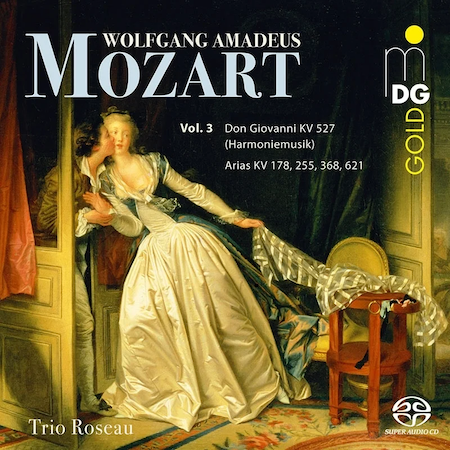Vol. 3
Arrangements from Don Giovanni for Wind Trio d’Anches
Arias arranged for oboe, cor anglais, clarinet and string trio
Trio Roseau
Kathrin Rebus Violin
Taia Lysy Viola
Fabrizio Scilla Cello
MDG Gold MDG 903 2246-6
Full price

The Review
Ulf-Guido Schäfer is the clarinettist of the Trio Roseau and he is a highly skilful arranger, as well as a superb player.
These arrangements are delightful and the limiting of Mozart’s intricate full operatic score to three instruments (oboe, clarinet and bassoon which make up the so-called trio d’anches) is accomplished with elegance. Just as importantly little of the essential Mozart is lost in the process. He was cheerfully adept at arranging his own music as ‘harmoniemusik’, for wind ensembles – in Don Giovanni he brings them on stage in the last act to play bits of The Marriage of Figaro and other greatest hits when the Don is about to entertain the Commendatore’s statue to what turns out to be a fatal dinner.
Schäfer cleverly divides up the vocal lines between the upper instruments, the bassoon (Malte Refardt) usually keeping to its continuo role. Often the oboe has the best of the tunes. The only place where this does not completely work is in the rewriting of Là ci darem la mano, where the clunky bassoon rather undermines the seduction. It’s as if Ulf-Guido, emulating the Don, is distinctly apprehensive about luring Zerlina into the shrubbery or that nearby pavillion. Maybe there’s a scintilla of truth there, since the oboist, Rachel Frost, is his wife. For the rest though (and the sequence includes many of the opera’s most familiar melodies) the dramatic characterisation is deftly handled.
The five arias that form the second half of the disc are very different in feeling. Schäfer only joins in for the last pair of them (Parto ma tu ben mio and Non piu di Fiori from La Clemenza di Tito). For the rest these effectively become little sonatas for Rachel, accompanied by the strings. Ah, spegarti, Oh dio, KV 178, and Ombre felice, KV 255 are given to the cor anglais. Sperai vicino il Lido, KV 368 is taken by the oboe.
The results are mellow and beautifully polished, though here the drama is less evident. The arias become largely decorative, the perfect domestic background music. I’m sure this is not the intention and the playing, nimble and with immaculate ensemble throughout, suggests that live, the music would have energy that does not quite transfer to the sitting room. That hardly matters because this is an album that fulfils its function with grace and conviction. It nicely accompanies that first gin and tonic of the evening.
SM
